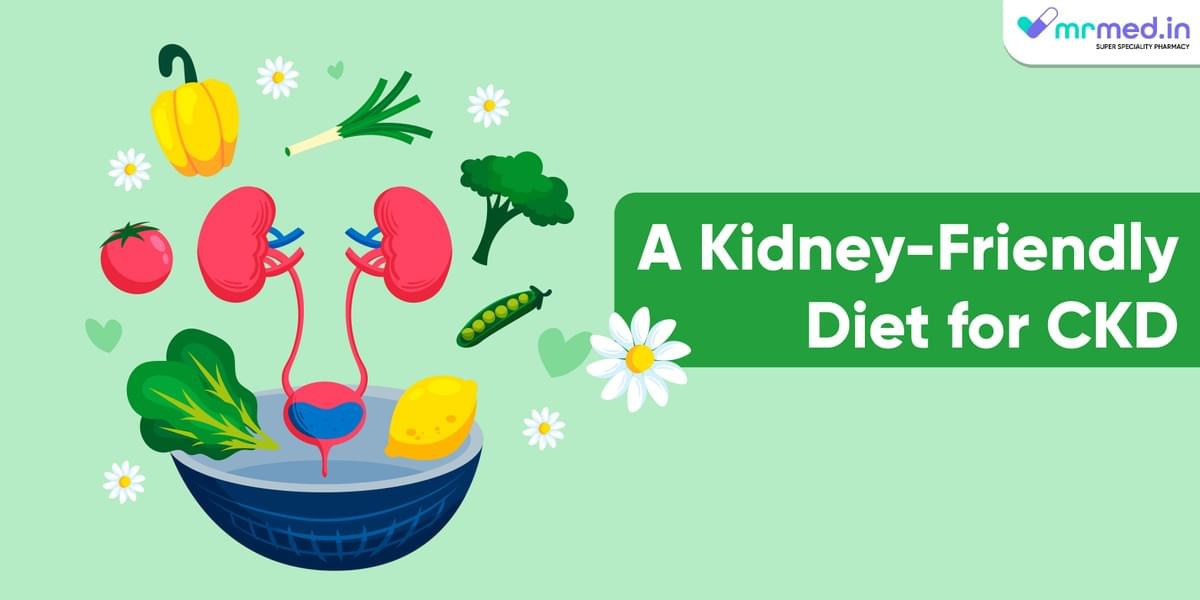Chronic Kidney Disease (CKD) affects millions of people worldwide, necessitating dietary adjustments to maintain kidney function and overall health. Adopting a kidney-friendly diet can significantly improve the quality of life for CKD patients by managing symptoms and slowing disease progression. This comprehensive guide will explore the principles of a kidney-friendly diet, recommend specific foods, and discuss how supplements and medications like Lenshil 12mg Capsule can support kidney health.
What is CKD?
CKD is a long-term condition characterised by gradual loss of kidney function. The kidneys are essential for filtering waste and excess fluids from the blood, maintaining electrolyte balance, and regulating blood pressure. When kidney function declines, waste products and fluids can build up in the body, leading to various health issues.

Diet plays a critical role in managing CKD. By choosing the right foods, patients can help control blood pressure, blood sugar, and cholesterol levels, all of which are crucial for kidney health. Additionally, a kidney-friendly diet can help prevent complications such as heart disease and bone disorders, which are common in CKD patients.
Key Principles of a Kidney-Friendly Diet
Limit Sodium Intake
High sodium intake can increase blood pressure and cause fluid retention, both of which put extra strain on the kidneys. To reduce sodium in your diet:
- Avoid processed foods and fast food.
- Choose fresh or frozen vegetables instead of canned ones.
- Use herbs and spices for seasoning instead of salt.
- Read food labels to check for sodium content.
Control Protein Consumption
While protein is essential for overall health, consuming too much can burden the kidneys. It's important to balance protein intake:
- Include high-quality protein sources like lean meats, poultry, fish, eggs, and plant-based proteins such as beans and legumes.
- Work with a dietitian to determine the right amount of protein for your specific needs.
Manage Potassium Levels
Potassium helps regulate heart and muscle function, but high levels can be dangerous for CKD patients. To manage potassium:
- Choose low-potassium fruits and vegetables like apples, berries, and green beans.
- Limit high-potassium foods such as bananas, oranges, tomatoes, and potatoes.
- Cook vegetables in water and drain to reduce potassium content.
Monitor Phosphorus Intake
Excess phosphorus can lead to bone and heart problems in CKD patients. To control phosphorus levels:
- Limit dairy products, nuts, seeds, and processed foods containing phosphorus additives.
- Choose low-phosphorus alternatives like almond milk and non-dairy creamers.
- Discuss with your doctor or dietitian whether phosphorus binders are necessary.
Stay Hydrated
Proper hydration is crucial, but fluid intake should be tailored to individual needs based on kidney function and treatment plan. Your healthcare provider can help determine the right amount of fluids for you.
Foods to Include in a Kidney-Friendly Diet
Low-Sodium Options
- Fresh fruits and vegetables: Apples, berries, bell peppers, and cabbage.
- Lean protein: Chicken breast, turkey, and white fish.
- Whole grains: Brown rice, quinoa, and whole wheat pasta.
Low-Potassium Foods
- Fruits: Apples, grapes, berries, and peaches.
- Vegetables: Green beans, carrots, cauliflower, and cabbage.
- Low-Phosphorus Choices
Non-dairy milk alternatives: Almond milk and rice milk.
- Fresh meats and seafood: Chicken, turkey, and shrimp.
- Egg whites and egg substitutes.
- Supplements and Medications
Supplements like Nestle Resource Renal Powder can be beneficial for CKD patients who struggle to meet their nutritional needs through diet alone. This specialised dietary supplement is designed to support kidney health by providing a balanced mix of protein, vitamins, and minerals while being low in phosphorus and potassium.
Kidney Medications such as Lenshil 12mg Capsule may be prescribed to help manage CKD symptoms and complications. These medications can help control blood pressure, reduce proteinuria, and protect kidney function. Always follow your healthcare provider's recommendations regarding medication use.
Creating a Kidney-Friendly Meal Plan: A 6-Step Guide
Here are the essentials you should keep in mind:
Breakfast Ideas
- Oatmeal topped with berries and a sprinkle of cinnamon.
- Scrambled egg whites with bell peppers and a slice of whole-grain toast.
- Smoothie made with almond milk, spinach, blueberries, and a scoop of low-protein powder.
Lunch Suggestions
- Grilled chicken salad with mixed greens, cucumbers, and a low-sodium vinaigrette.
- Turkey and avocado wrap with whole-grain tortilla and a side of apple slices.
- Quinoa bowl with roasted vegetables and a drizzle of olive oil.
Dinner Options
- Baked salmon with a side of green beans and brown rice.
- Stir-fry with tofu, broccoli, carrots, and low-sodium soy sauce served over quinoa.
- Roasted chicken breast with steamed cauliflower and a small serving of sweet potato.
Snacks and Desserts
- Fresh fruit salad with low-potassium fruits.
- Carrot sticks with hummus.
- Greek yoghurt (if phosphorus levels allow) with a handful of berries.
Before going to a restaurant, check the menu online for kidney-friendly options. Look for dishes that are low in sodium, potassium, and phosphorus.
Ask for Modifications
Don’t hesitate to ask for modifications to your meal, such as requesting no added salt, substituting high-potassium vegetables for lower ones, or asking for dressings and sauces on the side.
Choose Wisely
Opt for grilled, baked, or steamed dishes instead of fried or heavily sauced items. Salads with lean proteins and low-sodium dressings are usually good choices.
Monitoring and Adjusting Your Diet
Regular Check-Ups
Regular check-ups with your healthcare provider are essential for monitoring kidney function and adjusting your diet as needed. Blood tests can help assess levels of electrolytes, minerals, and waste products in your blood.
Dietitian Support
Working with a registered dietitian who specialises in kidney disease can provide personalised guidance and help you create a sustainable eating plan that meets your nutritional needs and preferences.
Regular monitoring and adjustments, along with professional support, will help ensure the effectiveness of dietary changes and improve the quality of life for those living with CKD.
